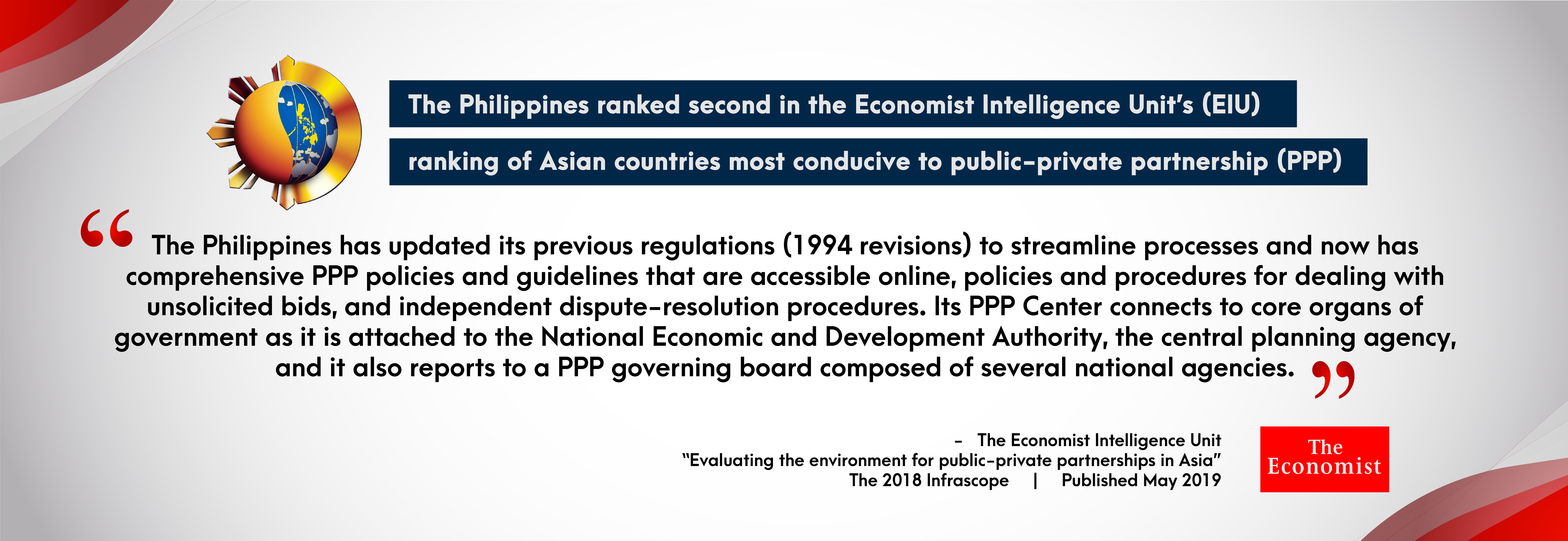
In its 2018 Infrascope Index Report, The Economist Intelligence Unit (EIU) of the London-based The Economist Group ranked the Philippines second in the top overall category for having a mature PPP environment garnering a score of 81%, with Thailand taking the top spot with 83% and China getting an 80% mark.
“The regulatory environment in the Philippines is notably good: other than Thailand, the Philippines is the only country in the ‘mature’ tier,” it added. “The Philippines has updated its previous regulations (1994 revisions) to streamline processes and now has comprehensive PPP policies and guidelines that are accessible online, policies and procedures for dealing with unsolicited bids, and independent dispute-resolution procedures. Its PPP Center connects to core organs of government as it is attached to the National Economic and Development Authority (NEDA), the central planning agency, and it also reports to a PPP governing board composed of several national agencies,” the EIU said.
Category findings
The Infrascope Index is a benchmarking tool that evaluates the capacity of countries to implement sustainable and efficient public-private partnerships (PPPs). The index evaluates the PPP environment across five components: enabling laws and regulations, the institutional framework, maturity, the investment and business climate, and financing.
The EIU report revealed that nine of the 19 countries and subnational governments scored in the “developed” category for their regulatory environment, with Thailand and the Philippines ranking top as “mature”. Regulatory performance looks at PPPs as a procurement modality, having commonly adopted best practices, including provisions guiding selection criteria, mechanisms for conciliation and arbitration, and mandatory environmental impact assessments.
The Philippines has also been scored high in terms of institutional transparency with the EIU report stating that “the Philippines and its PPP unit has a well-structured website with up-to-date information including laws, administrative orders, circulars, executive orders and guidelines (such as guidelines for unsolicited proposals)”.
The maturity domain meanwhile covers the extent to which countries and subnational governments have experience in delivering PPPs, and also the stability and predictability of their infrastructure sector. One measure of maturity is how many PPP projects have been delivered. The most experienced countries are PRC and India, followed by Thailand and the Philippines. The EIU report explains, “a large number of PPPs does, in and of itself, indicate a level of maturity, since without the right frameworks and norms in place, it is unlikely that the modality would be so regularly utilized.”
Meanwhile, four countries and one subnational government score in the “mature” category for their investment and business climates: India (90), the Philippines (87), PRC (85), Gujarat (83) and Thailand (80). The Philippines, scores highly, for its bipartisan support from the current political leadership and the opposition.
And finally, under the financing category which measures the level of government payment risk, the depth of capital markets for private infrastructure, the participation of institutional investors, and currency risk, the Philippines shares the top spot with Thailand, India, PRC and Gujarat. These countries have very low sovereign payment risk. The EIU report also noted that the Philippines, issued a US$150m green bond from BDO Unibank in 2017 which was the first green bond investment by the International Finance Corporation (part of the World Bank Group) to be used to finance projects including renewable energy and green buildings.
In its 2014 Infrascope Report, the EUI ranked the Philippines as the most improved country in the Asia-Pacific region for PPP readiness, categorizing the country as a developed PPP market.

